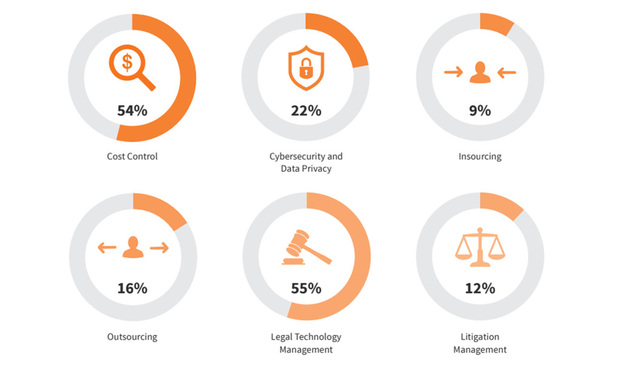Legal Operations Leaders Say Blockchain, Artificial Intelligence Still Not Mainstream in Their Companies
Those are some of the key findings in the 2019 Consero Legal Operations Survey Report, based on a poll of 85 legal-ops executives who attended a recent forum.
January 31, 2019 at 06:05 PM
5 minute read
 Legal ops chiefs' top priorities in the next 12 months. (Courtesy photo)
Legal ops chiefs' top priorities in the next 12 months. (Courtesy photo)
In-house legal operations chiefs see their main priorities as managing legal technology and cost-cutting, primarily on outside counsel spending. Blockchain remains a confusing concept to them, while artificial intelligence is the hottest topic of conversation.
Those are some of the key findings in the 2019 Consero Legal Operations Survey Report, based on a poll of 85 legal-ops executives who attended a recent forum. Consero Group presents executive conferences, and it did the report in partnership with Thomson Reuters Legal Tracker.
 John Pfannenbecker (Courtesy photo)
John Pfannenbecker (Courtesy photo)Many of its findings ring true to one participant, John Pfannenbecker, deputy general counsel for legal operations and business affairs at World Franchise Inc., parent company of the Subway restaurant chain based in Milford, Connecticut.
“The findings are pretty consistent with what I've been hearing from colleagues,” Pfannenbecker said in an interview this week. “Cost control is my top priority, so I wasn't surprised to see that from a large percentage of others.”
The findings also coincide with what last year's Consero survey found. The 2019 report showed most participants cited legal tech management and cost control as their top priorities, followed by cybersecurity and data privacy. “Cyber and data privacy was handled in our legal department at one time,” Pfannenbecker said, “but we separated it out and gave it to the [information technology] department. But there are in-house attorneys still in it.”
He said he's been doing legal tech work eight years at his company, and “the first five years I didn't realize there was a separate thing called legal ops. That's how new this is.”
The survey said the majority of respondents, 65 percent, reported their companies are just developing legal ops or are in the early stages of adopting it. Another 29 percent called their operations “mature,” while only 6 percent said it was “very mature.”
Pfannenbecker noted, “My team and my chief legal officer think we are so far behind other companies, and then I go to forums like this and see we are as mature or farther advanced than others.”
He said he spends about 75 percent of his time overseeing and managing the legal operations with a team that includes two other full-time people and one part-timer. “I also act as a traditional in-house counsel on financing and commercial transactions about 25 percent of the time,” he added.
The report said 38 percent of companies dedicate two to five staff members to legal ops. About 34 percent only have one legal tech staffer, while 13 percent said they have over 10.
A whopping 71 percent of respondents said their legal technology infrastructure does not meet the needs of their operations. But 74 percent also reported that they expect legal technology spend to increase in the next 12 months.
“I agree that legal tech infrastructure is a concern for nearly all legal ops departments,” Pfannenbecker said. “Some companies are just now implementing things we implemented years ago.”
He explained his company uses matter management and e-billing software along with contract management, which are the most common form of legal tech in use.
The survey said 95 percent of the respondents do not use blockchain. “The forum had a breakout session on blockchain,” Pfannenbecker said, “and it's still very confusing as to how it applies to legal departments and workflows. But I think, once people understand what it does, they will say, 'Oh, yes, we have something like that.' Only about five percent of them really understand it right now.”
The survey showed that 64 percent of respondents said they were considering use of artificial intelligence. “That's one of the hottest topics talked about,” Pfannenbecker said. “We're considering it too, but getting people to move to those types of solutions is very difficult.”
He said some troubling questions include should companies trust AI to do certain jobs, will there be a return on investment to justify the cost, and what could companies do about the human beings it could replace.
“Those are leaps that are harder for nontech companies to take,” he added. “It's easier for tech companies because it's in their culture.”
The next big thing for most companies, including his, is better use of metrics, he said. Besides e-billing, he said his team is looking at what metrics matter most to legal and what does the business side need to see.
The report said 80 percent of respondents do not have a metrics program that measures the value delivered by legal ops.
It concluded, “Using the right technology tools and deriving actionable insight from metrics will allow legal ops executives to support their legal departments efficiently and effectively to protect and grow their companies.”
This content has been archived. It is available through our partners, LexisNexis® and Bloomberg Law.
To view this content, please continue to their sites.
Not a Lexis Subscriber?
Subscribe Now
Not a Bloomberg Law Subscriber?
Subscribe Now
NOT FOR REPRINT
© 2025 ALM Global, LLC, All Rights Reserved. Request academic re-use from www.copyright.com. All other uses, submit a request to [email protected]. For more information visit Asset & Logo Licensing.
You Might Like
View All
Global Software Firm Trying to Jump-Start Growth Hands CLO Post to 3-Time Legal Chief

Meta Workers Aren't of One Mind on Company's Retreat From DEI, Fact-Checking

Ad Agency Legal Chief Scores $12M Golden Parachute in $13B Sale to Rival
3 minute read
Trending Stories
- 1With DEI Rollbacks, Employment Attorneys See Potential for Targeting Corporate Commitment to Equality
- 2Trump Signs Executive Order Creating Strategic Digital Asset Reserve
- 3St. Jude Labs Sued for $14.3M for Allegedly Falling Short of Purchase Expectations
- 4'Ridiculously Busy': Several Law Firms Position Themselves as Go-To Experts on Trump’s Executive Orders
- 5States Reach New $7.4B Opioid Deal With Purdue After SCOTUS Ruling
Who Got The Work
J. Brugh Lower of Gibbons has entered an appearance for industrial equipment supplier Devco Corporation in a pending trademark infringement lawsuit. The suit, accusing the defendant of selling knock-off Graco products, was filed Dec. 18 in New Jersey District Court by Rivkin Radler on behalf of Graco Inc. and Graco Minnesota. The case, assigned to U.S. District Judge Zahid N. Quraishi, is 3:24-cv-11294, Graco Inc. et al v. Devco Corporation.
Who Got The Work
Rebecca Maller-Stein and Kent A. Yalowitz of Arnold & Porter Kaye Scholer have entered their appearances for Hanaco Venture Capital and its executives, Lior Prosor and David Frankel, in a pending securities lawsuit. The action, filed on Dec. 24 in New York Southern District Court by Zell, Aron & Co. on behalf of Goldeneye Advisors, accuses the defendants of negligently and fraudulently managing the plaintiff's $1 million investment. The case, assigned to U.S. District Judge Vernon S. Broderick, is 1:24-cv-09918, Goldeneye Advisors, LLC v. Hanaco Venture Capital, Ltd. et al.
Who Got The Work
Attorneys from A&O Shearman has stepped in as defense counsel for Toronto-Dominion Bank and other defendants in a pending securities class action. The suit, filed Dec. 11 in New York Southern District Court by Bleichmar Fonti & Auld, accuses the defendants of concealing the bank's 'pervasive' deficiencies in regards to its compliance with the Bank Secrecy Act and the quality of its anti-money laundering controls. The case, assigned to U.S. District Judge Arun Subramanian, is 1:24-cv-09445, Gonzalez v. The Toronto-Dominion Bank et al.
Who Got The Work
Crown Castle International, a Pennsylvania company providing shared communications infrastructure, has turned to Luke D. Wolf of Gordon Rees Scully Mansukhani to fend off a pending breach-of-contract lawsuit. The court action, filed Nov. 25 in Michigan Eastern District Court by Hooper Hathaway PC on behalf of The Town Residences LLC, accuses Crown Castle of failing to transfer approximately $30,000 in utility payments from T-Mobile in breach of a roof-top lease and assignment agreement. The case, assigned to U.S. District Judge Susan K. Declercq, is 2:24-cv-13131, The Town Residences LLC v. T-Mobile US, Inc. et al.
Who Got The Work
Wilfred P. Coronato and Daniel M. Schwartz of McCarter & English have stepped in as defense counsel to Electrolux Home Products Inc. in a pending product liability lawsuit. The court action, filed Nov. 26 in New York Eastern District Court by Poulos Lopiccolo PC and Nagel Rice LLP on behalf of David Stern, alleges that the defendant's refrigerators’ drawers and shelving repeatedly break and fall apart within months after purchase. The case, assigned to U.S. District Judge Joan M. Azrack, is 2:24-cv-08204, Stern v. Electrolux Home Products, Inc.
Featured Firms
Law Offices of Gary Martin Hays & Associates, P.C.
(470) 294-1674
Law Offices of Mark E. Salomone
(857) 444-6468
Smith & Hassler
(713) 739-1250






